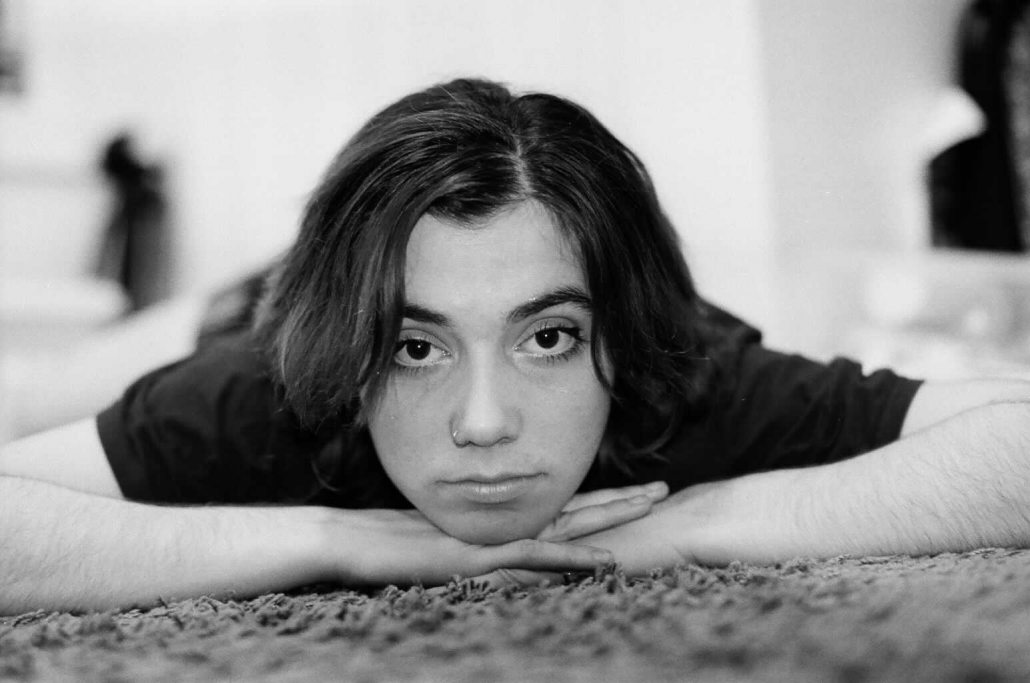Student’s poetry book “Moldy Tears” intimately describes what it’s like to live with depression

Mold is a fungus that grows in dark and moist environments. It spreads easily and in some cases, it can be lethal. Tears are often shed in the darkest moments of our lives, perfect conditions for the creation of mold. “Moldy Tears,” a self-published poetry book written by Fiona Pestana, a senior majoring in journalism, carries this metaphor into the great depths of emotion.
In “Moldy Tears,” released Dec. 18, the 22-year-old presents an intimate look into their struggle with depression and the way it has affected their relationship with themselves and others. Pestana, who grew up in San Jose, Calif., assembled 22 poignant poems into a cohesive work that is both captivating to read and view.
The words on the page are adorned by images of places such as a rocky beach and a lonely lamp post isolated in a sea of fluffy grass. The illustrations of mushrooms by Maddie Kutler, who graduated from USC in 2020, add another layer of depth and visual appeal to the book.
“It was basically all up to her creative discretion,” Pestana said about Kutler’s decision to draw mushrooms. “They all relate to the poems they’re next to somehow.”
The mushrooms perpetuate the idea of “moldy tears” and how emotions can spread like mold within the mind, sometimes for a very long time. But Pestana found that it is also within the mind where we can learn to understand our behaviors.
“Going back and looking at past things kind of gives context as to why I experienced these difficulties,” Pestana said. “When something is happening and I’m clouded by depressive thoughts or intrusive thoughts, the present moment isn’t very clear and it isn’t until I look back that things kind of make sense.”
In a sense, writing “Moldy Tears” was therapeutic for Pestana.
“More than anything, poetry helps me wrap my head around whatever it is that I’m going through,” Pestana said.
The journey which Pestana goes through in this book follows a clear story arc that begins with somber words and ends with gratitude. Take, for example, the first poem titled “my dearest mother.”
“My dearest mother, I bring you the news that my dying politeness is drowning in booze,” Pestana said in the opening poem. “With the blues of a jazz bar backing its death now mother, oh mother, I’ve got nothing left.”
Emptiness — that is what the first poem seems to imply about Pestana’s mental state at the time. It is a poem that is representative of the internal and constant struggle with depression. But, Pestana shows that it is possible to reach the light at the end of the tunnel.
In the book’s final poem, Pestana’s perspective is radically different than in poems such as “karan,” and “what stays, what’s sacred?” which appear halfway through. In “something please prick my finger (life update),” Pestana has reached the end of the introspective journey.
“I’m in love with life and it punches me in the gut,” the poem reads. “But sometimes you find a family, an umbrella in this storm.”
“Moldy Tears” is very much about Pestana’s journey with mental health, but it centers around experiences with other people. This coexistence with others and the importance of relationships within our lives is reflected in the way Pestana created “Moldy Tears.” Although the poems were exclusively written by Pestana, they couldn’t complete the book without a little help from their friends.
Pestana trusted Kutler to create the illustrations for the book, and others like Alia Atkins, a senior studying creative writing and political science, helped in different ways. Atkins was among those that Pestana sought advice from on their poetry.
“I didn’t have any real feedback, I think a lot of people just commented on the order of some of the poems,” Atkins said. “Seeing them rearrange the poems in a way that some of the heaviest stuff kind of being more at the end so that there’s a bit of an arc to it.”
For example, Atkins said that she and others advised Pestana on the order of the poetry so that the book followed a story arc. They essentially helped Pestana find the beginning and end of “Moldy Tears.”
But, the journey of “Moldy Tears” does not end within the borders of its pages. Pestana decided to release the book under a “name your price” model, which essentially allows you to choose the price to pay for the book. There is no catch, but there is a very important underlying reason for their decision to release the book in this manner.
“Everyone deserves the opportunity to end up at that place of okay-ness,” Pestana said on the Instagram post where they announced the release of the book. “I am dedicating this collection to the National Queer and Trans Therapists of Color Network, which provides mental health-oriented help for queer and trans people of color.”
Pestana understands that therapy isn’t accessible for everyone, especially people of color, which is why they decided to donate 50% of the proceeds to NQTTCN. So far, Pestana has donated $312 to the organization.
Kutler also spoke about the importance of this cause.
“It’s an amazing thing to write about mental health and then to also give money to places that are helping people with a mental illness,” Kutler said.
“Moldy Tears” is a poetry book about Pestana’s journey through depression, but it is also about love and friendship.
After speaking to Kutler and Atkins, it was clear that “Moldy Tears” was made with those two themes in mind. It was a collaborative effort helmed by Pestana’s experiences and their will.
“Moldy Tears” is available for purchase here, just name your price.

